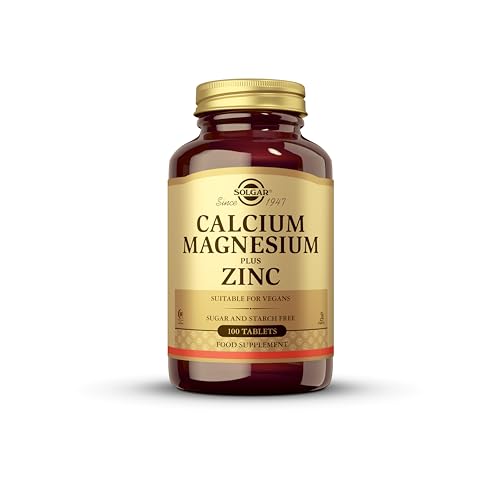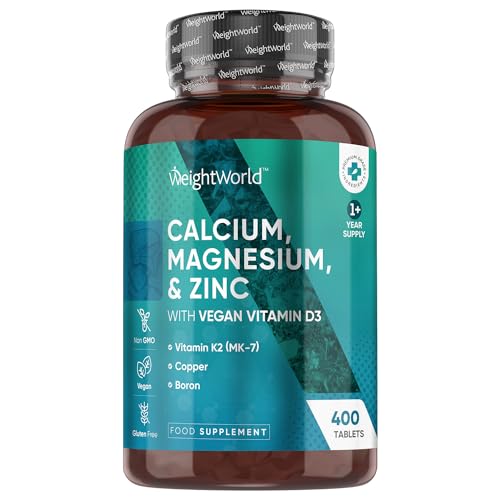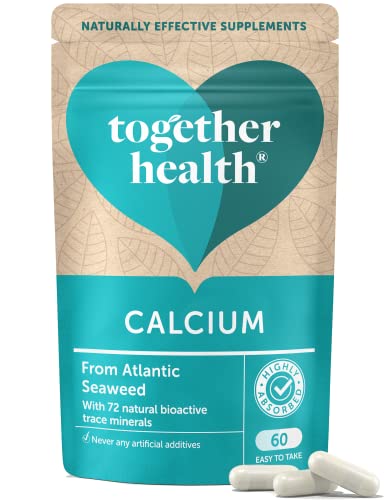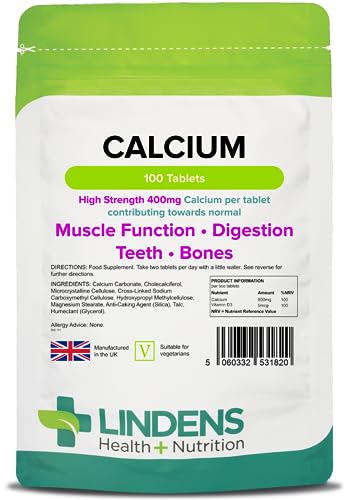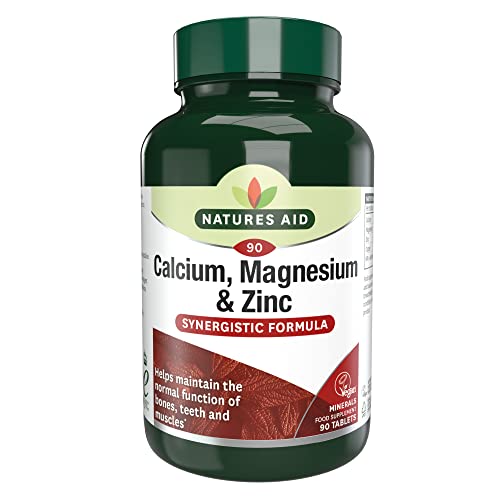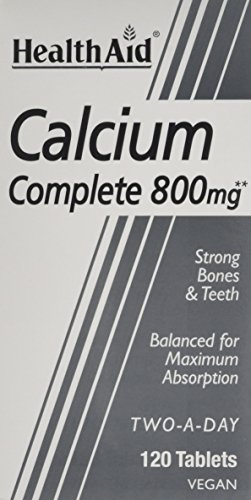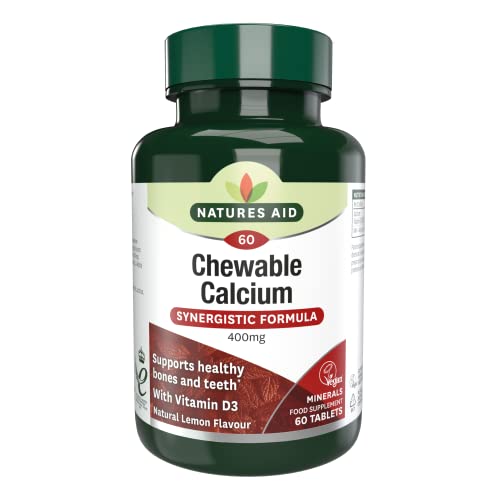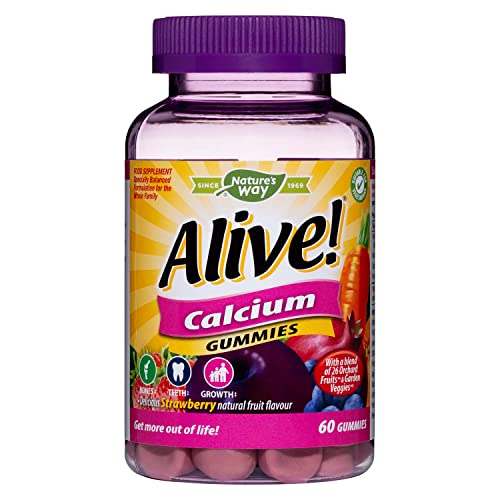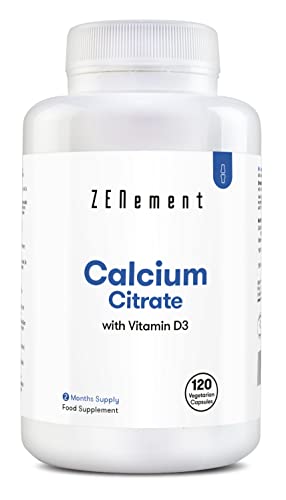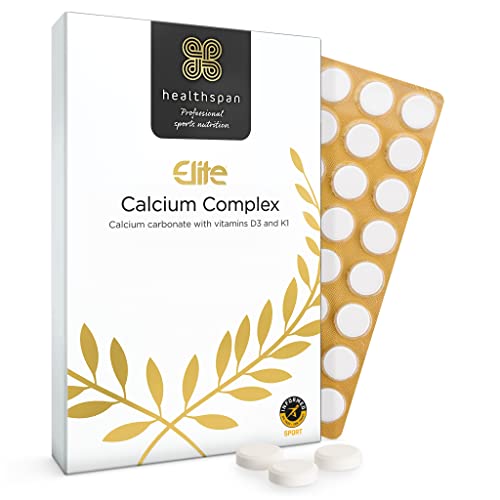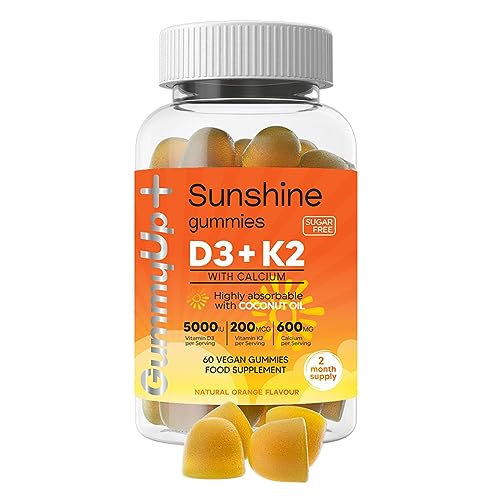Introduction
Welcome to the world of bone health! As a dietitian committed to helping you nourish your body, I am excited to delve into the extremely confusing realm of Calcium supplements, a topic often overlooked in the quest for overall well-being. Calcium is not just a building block for strong bones; it plays a pivotal role in muscle function, nerve transmission, and blood clotting. Despite its importance, many of us fall short of meeting our daily calcium needs through diet alone. That’s where calcium supplements step in to bridge the nutritional gap.
In this article, we’ll explore the best calcium supplements available in the British market, considering factors such as absorption rates, formulation, and additional nutrients that complement calcium’s effectiveness. I’ll guide you through the nuances of choosing the right supplement for your unique needs, whether you’re a lactose-intolerant individual seeking non-dairy sources or an athlete looking to support bone density under high impact.
Join me on this journey to unravel the secrets of calcium supplementation and empower yourself with the knowledge to make informed decisions for a stronger, healthier you. After all, when it comes to your bones, a little extra care can go a long way!

Our pick of the 12 best Calcium Supplements of 2024 in UK
Zotezo Score | Best Calcium Tablets | Lowest Price |
|---|---|---|
|
A |
||
|
A |
||
|
B |
||
|
B |
||
|
C+ |
||
|
C+ |
||
|
C+ |
||
|
C+ |
||
|
C |
||
|
C |
||
|
C |
||
|
C |
Let's take a deep dive into these 12 best Calcium Tablets in UK
Best Overall Calcium Tablets in UK
Solgar
A
Zotezo review
Solgar is a powerful, high-potency formula of calcium, magnesium, and zinc which help in nurturing healthy bones and muscles. Magnesium and zinc also feature as antioxidants, fighting off free radicals. Solgar brand is a very trustworthy brand and has been delivering quality supplements since 1947. They are on par with the “Gold Standard”, something which only quality brands achieve.
Product details
Benefits of Solgar® Calcium Magnesium Plus Z...
Drawbacks
Best Calcium Tablets Runner Up in UK
WeightWorld
A
Zotezo review
WeightWorld Calcium, Magnesium, and Zinc tablets are the only supplements containing Vitamin K2. This vitamin along with Vitamin D3, ensures that calcium is well absorbed by all bones in the body. Regular consumption of these supplements will also bring down fatigue levels, thanks to the presence of magnesium. Some other benefits of these tablets include a good immune system, and good hair, skin, and nail health. Vitamin K enhances normal blood clotting. Vitamin D is present in vegan form and this has been proved in laboratories. These supplements have been made by following the GMP guidelines. WeightWorld has been a trusted brand since 2006 and you can rely on its quality.
Product details
Benefits of WeightWorld Calcium, Magnesium a...
Weaknesses
Best Vegan Calcium Tablets in UK
Together
B
Zotezo review
Together Health has brought out these completely naturally sourced calcium supplements which do not contain any impurities. These supplements contain calcium sourced from sustainably harvested seaweed. This enables better calcium absorption by the body. Apart from calcium, there are 72 other trace minerals. Moreover, there are no ocean impurities present within these supplements and this has been proved. These supplements are free from any kind of allergens and are absolutely safe to consume.
Product details
Benefits of Calcium Together Health Seaweed-...
Disadvantages
Best Calcium Tablets With Vitamin D in UK
Lindens
B
Zotezo review
Lindens Calcium tablets contain calcium along with Vitamin D3, both of which supply that much-needed strength to your muscles. Calcium is also good for healthy bone and teeth formation. This essential mineral can also contribute towards having a healthy digestive system, by regulating the digestive enzymes. It also helps in regulating metabolic activities and helps with blood clotting. Lindens Health and Nutrition is famous for bringing out consumer nutrition supplements. Their packaging is quite eco-friendly and resealable.
Product details
Benefits of Lindens Calcium Tablets with Vit...
Negatives
Best Calcium Tablets With Magnesium in UK
Natures Aid
C+
Zotezo review
Natures Aid has brought out these Calcium, Magnesium, and Zinc supplements which work towards strengthening the bones and muscles. Even your hair, skin, and nails will highly benefit from the regular intake of these supplements. Ideal for vegans and vegetarians. These are made as per GMP & Pharmaceutical Standards.
Product details
Benefits of Natures Aid Calcium, Magnesium a...
Cons
Best Calcium Tablets With Low Dose in UK
HealthAid
C+
Zotezo review
HealthAid Calcium Complete is a specially designed formula containing a good amount of calcium. These supplements are formulated in a manner that the body receives ample amounts of calcium desired for various functions like the development of strong bones and teeth. Calcium is also essential for a healthy nervous system.
Product details
Benefits of HealthAid Calcium Complete 800mg
Drawbacks
Best Chewable Calcium Tablets in UK
Natures Aid
C+
Zotezo review
Natures Aid Chewable Calcium tablets are in lemon flavor. Calcium along with Vitamin D3 is essential for the development of healthy bones and teeth. It has been made as per GMP Standards. This tablet is suitable for vegetarians. Moreover, it does not contain any artificial flavors and colors.
Product details
Benefits of Natures Aid Chewable Calcium wit...
Weaknesses
Best Calcium Tablets For Gummies in UK
Nature's Way
C+
Zotezo review
Alive Calcium Gummies contain calcium, phosphorus and Vitamin D3. All of these work together to strengthen and develop bones in kids. These supplements also contain the goodness of 26 whole fruits and vegetable extracts. Supplements come in natural fruit flavors like strawberry.
Product details
Benefits of Alive! Calcium Gummies with Vita...
Disadvantages
Best Calcium Tablets For Kids in UK
Wellgard
C
Zotezo review
Wellgard Kids Calcium and D3 Gummies promote strong bones, teeth, and muscles in children. Each serving has calcium equivalent to 3 glasses of milk. These supplements contain Vitamin D3, which is essential for good bone development. Made from 100% plant-based ingredients and does not contain any allergens. They come in peach flavor and are quite tasty.
Product details
Benefits of Wellgard Kids Calcium & D3 ...
Negatives
C
Zotezo review
Calcium Citrate along with Vitamin D addresses low calcium levels in people who are unable to get sufficient of this mineral. Vitamin D accelerates the absorption of calcium and phosphorus, thereby strengthening the bones. These capsules are suitable for vegetarians and do not contain any additives. They are manufactured in Spain and contain pure ingredients.
Product details
Benefits of Calcium Citrate With Vitamin D3 ...
Healthspan Elite
C
Zotezo review
Calcium Complex has been designed to provide your bones with adequate nutrition. Calcium is present here in the form of calcium carbonate, which has the highest quantity of calcium compared to other forms. Calcium carbonate along with Vitamin D3 and Vitamin K1 contribute to healthy bones. Anti-doping laboratory has tested this product for any banned substances and it has cleared all the checks. Hence, it is sports-accredited.
Product details
Benefits of Healthspan Elite Calcium Complex...
Novomins
C
Zotezo review
Calcium, along with Vitamin D and K2 helps in strengthening bones and teeth. It comes with a rich content of calcium (400 mg). Comes in a natural peach flavor. Does not contain any allergens or artificial flavors.
Product details
Benefits of Calcium Gummies with Vitamin D &...
Weaknesses

The Grand Wellness Awards
Discover excellence in wellness with 'The Grand Wellness Awards by Zotezo! This prestigious award recognizes the finest wellness brands across 14 countries that prioritize your well-being. From nourishing supplements to rejuvenating self-care products, we honor the best in the industry. Embrace a healthier lifestyle and explore the trusted brands that elevate your wellness journey.
Tips for choosing the right Calcium Supplements for you
Here’s a clear roadmap to help you navigate the aisles with confidence and choose the best calcium companion for your bones. As a dietitian, my mission is to empower you with knowledge so that you can make an informed decisions about your health. Let’s delve into the essential considerations when shopping for the best calcium supplements in UK.
1. Types of Calcium: Choosing the Right Form for You
The first step on your calcium crusade is understanding the various types of calcium. Calcium carbonate, derived from limestone or marble, is a budget-friendly option with a high elemental calcium content. It’s best taken with meals to capitalize on stomach acid for absorption. Calcium citrate, on the other hand, is a stellar choice for enhanced absorption, requiring no stomach acid. It’s slightly pricier but may be worth the investment for those with low stomach acid production.
Calcium phosphate provides a middle ground, often paired with phosphorus for comprehensive bone support. Calcium gluconate and calcium lactate, both vegetarian-friendly options, cater to those with dietary restrictions. Each type comes with its unique set of pros and cons, so consider factors like absorption rates and elemental calcium content when making your selection.
2. Certifications: Seeking Quality Assurance
When it comes to supplements, quality matters. Look for products that have undergone third-party testing for purity and potency. Certifications from organizations like NSF International, USP, or Informed-Choice can be indicators of a product’s commitment to quality. These certifications ensure that what’s on the label is what’s in the bottle and that the product is free from contaminants.
3. Additional Ingredients: The Good and the Not-So-Good
Beyond calcium, many supplements come fortified with additional nutrients to enhance absorption or offer complementary health benefits. Vitamin D is a common companion, as it aids in calcium absorption and supports overall bone health. Magnesium is another ally, helping regulate calcium levels in the body. Look for these synergistic pairings to maximize the benefits of your calcium supplement.
However, be cautious of unnecessary additives and fillers. While some supplements may include herbs or botanicals for added health perks, others might contain artificial colors, preservatives, or allergens. Read the ingredient list diligently, and opt for products with minimal, clean additives.
4. Harmful Ingredients: What to Avoid
Equally important is knowing what to steer clear of in your calcium supplement. Certain ingredients can hinder absorption or pose risks to your health. Avoid supplements with excessive amounts of lead, as even low levels can have adverse effects. Additionally, some supplements contain oxalic acid or phytic acid, naturally occurring compounds that can bind to calcium and inhibit absorption. If you have a history of kidney stones, it’s advisable to avoid calcium supplements with added oxalic acid.
5. Dosage: Striking the Right Balance
Determining the appropriate dosage requires a nuanced understanding of your individual needs. The recommended daily intake of calcium varies by age, gender, and life stage. Generally, adults aim for around 1000 to 1300 mg per day, with the understanding that dietary sources contribute to this total. However, more is not always better. Excessive calcium intake can lead to side effects like constipation or interfere with the absorption of other minerals.
Consider your dietary calcium intake, and calculate the amount you need from supplements to reach the recommended daily allowance. Remember to account for calcium from food sources to avoid exceeding the upper limit. If you have specific health concerns or conditions, consult with a healthcare professional to tailor your dosage accordingly.
6. Absorption Factors: Maximizing Bioavailability
Calcium absorption doesn’t happen in isolation; it’s influenced by various factors. Vitamin D, as mentioned earlier, is a key player in enhancing calcium absorption. Magnesium, vitamin K, and boron also contribute to the intricate dance of minerals in bone health. Consider a supplement that includes these cofactors to optimize calcium absorption and utilization.
However, certain substances can impede calcium absorption. Excessive caffeine, alcohol, and high levels of dietary fiber can hinder the body’s ability to absorb calcium. If you consume these substances regularly, be mindful of spacing them out from your calcium intake.
7. Formulation: Time-Release or Traditional?
Calcium supplements come in various formulations, including traditional tablets, chewable tablets, softgels, and time-release capsules. The right choice depends on your preferences and digestive sensitivities. Traditional tablets are convenient but may be challenging for some to swallow. Chewable tablets can be a tasty option, but they often contain added sugars or artificial sweeteners.
Time-release capsules are designed to gradually release calcium over an extended period. While this can be beneficial for individuals who struggle with absorption or experience gastrointestinal discomfort, others may prefer the immediate release provided by traditional forms.
8. Individual Health Considerations: Tailoring Your Choice
Your unique health profile should guide your calcium supplement selection. Individuals with lactose intolerance or dairy allergies may lean towards non-dairy calcium sources. Those with kidney conditions should consult their healthcare provider, as excessive calcium intake can strain the kidneys. If you’re pregnant or breastfeeding, your calcium needs increase, making supplementation more crucial.
Consider any medications you’re taking, as certain drugs can interact with calcium supplements. For instance, calcium can interfere with the absorption of certain antibiotics and thyroid medications. Always inform your healthcare provider about your supplement regimen to ensure compatibility with your overall health plan.
9. Price and Brand Reputation: Balancing Quality and Budget
While cost is a legitimate consideration, don’t compromise on quality for the sake of a lower price tag. Invest in reputable brands with a track record of producing high-quality supplements. Generic or store brands can be cost-effective, but ensure they meet quality standards through third-party certifications.
Advantages of using Calcium Supplements
1. Enhanced Bone Health:
One of the primary reasons individuals turn to calcium supplements is to fortify their skeletal structure. The benefits extend beyond mere prevention of osteoporosis; optimal calcium levels contribute to bone density, reducing the risk of fractures and promoting overall bone health. This is particularly crucial as we age, given the natural decline in bone density that accompanies the aging process. By selecting the best calcium supplement suited to individual needs, individuals can proactively safeguard themselves against the ravages of brittle bones and fractures.
2. Cardiovascular Health:
Recent studies have shed light on the intriguing connection between calcium intake and cardiovascular health. Adequate calcium levels appear to play a role in maintaining optimal blood pressure and preventing hypertension. Calcium supplements, when integrated judiciously into a balanced diet, may contribute to cardiovascular well-being by supporting the proper functioning of the heart muscles and blood vessels. However, it is crucial to strike a balance, as excessive calcium intake may have adverse effects on cardiovascular health.
3. Muscle Function and Contraction:
Calcium’s influence extends beyond the skeletal system to the realm of muscular function. The intricate dance between calcium ions and muscle fibers is essential for every movement our bodies make. Insufficient calcium levels can compromise muscle contraction, leading to cramps, spasms, and overall muscular weakness. Calcium supplements, when incorporated sensibly into a nutrition plan, can assist in maintaining the delicate equilibrium required for smooth, coordinated muscle function.
4. Neurological Implications:
Intriguingly, calcium plays a crucial role in nerve transmission and the release of neurotransmitters. Sufficient calcium levels contribute to optimal cognitive function, supporting memory, learning, and overall neurological health. As we age, preserving cognitive abilities becomes a paramount concern, and the inclusion of the right calcium supplement may prove to be a strategic ally in this endeavor. While more research is needed to fully elucidate the nuanced relationship between calcium supplementation and neurological health, preliminary findings suggest promising avenues for exploration.
5. Pregnancy and Beyond:
The significance of calcium magnifies during pregnancy, as the developing fetus relies on this mineral for the formation of a robust skeletal system. Expectant mothers often turn to calcium supplements to ensure both their own health and the optimal development of the baby. Additionally, calcium continues to play a pivotal role during the postpartum period, especially for breastfeeding mothers who need to replenish the calcium stores depleted during pregnancy. Careful consideration of the appropriate calcium supplement is crucial in these phases to meet the unique demands of pregnancy and lactation.
6. Digestive Health Considerations:
The absorption of calcium is contingent upon the health of our digestive system. Certain individuals, such as those with gastrointestinal conditions like Crohn’s disease or celiac disease, may experience impaired absorption of calcium from dietary sources. In such cases, calcium supplements can serve as a valuable resource, providing a more easily absorbable form of the mineral. However, consulting with a healthcare professional is imperative to determine the most suitable supplement and dosage, considering the individual’s specific health circumstances.
7. The Vitamin D Connection:
The synergy between calcium and Vitamin D is an alliance critical for optimal bone health. Vitamin D facilitates the absorption of calcium in the intestines, ensuring that the body can utilize this essential mineral effectively. Consequently, when considering calcium supplementation, it becomes imperative to also assess one’s vitamin D status. Many calcium supplements are fortified with vitamin D, streamlining the process of achieving a harmonious balance between these two vital nutrients.
8. Age-Related Considerations:
As we traverse through different life stages, our nutritional requirements undergo dynamic shifts. Children and adolescents, experiencing rapid bone growth, may benefit from calcium supplements to fortify their developing skeletal structures. In adulthood, the focus may shift to maintaining bone density and overall health. In the elderly, calcium supplements play a crucial role in mitigating the risk of osteoporosis and fractures. Tailoring calcium supplementation to align with age-specific needs is a sagacious approach to promoting lifelong bone health.
Disdvantages of using Calcium Tablets
While calcium supplements are widely regarded as beneficial for bone health, it’s crucial to be aware of potential side effects that can arise, especially when consumption exceeds recommended levels. One common side effect is gastrointestinal discomfort, often manifesting as constipation, bloating, or gas. This occurs because unabsorbed calcium in the intestines can attract water, leading to these discomforts. Selecting a calcium citrate supplement, which doesn’t rely on stomach acid for absorption, may mitigate these issues for individuals prone to gastrointestinal distress.
Excessive calcium intake can also contribute to the formation of kidney stones, particularly in those with a history of kidney issues or a predisposition to stone formation. It’s essential to strike a balance between meeting calcium needs and avoiding an overabundance. Staying well-hydrated and diversifying calcium sources through a balanced diet can help manage this risk.
Furthermore, calcium supplements may interfere with the absorption of certain medications. Individuals taking antibiotics, thyroid medications, or iron supplements should consult with their healthcare provider to determine the appropriate timing and dosage to avoid potential interactions. Calcium supplements can bind to these medications in the gastrointestinal tract, reducing their effectiveness.
Hypercalcemia, a condition marked by elevated levels of calcium in the blood, is a rare but serious side effect of excessive calcium intake. Symptoms may include nausea, vomiting, excessive thirst, and confusion. It’s imperative to stay within recommended daily limits and be mindful of dietary sources of calcium to prevent this condition.
For those with lactose intolerance or a sensitivity to dairy, some calcium supplements may contain lactose as a filler. Reading labels diligently and opting for lactose-free formulations can help prevent digestive discomfort in these individuals.
It’s worth noting that the risk of side effects is influenced by factors such as age, gender, overall health, and individual tolerance levels. Pregnant individuals and those who are lactating may experience increased susceptibility to certain side effects due to heightened calcium needs.
Various Types of Calcium Supplements
As a dietitian, my goal is to guide you through the various types of calcium supplements available, each with its own set of benefits and considerations.
1. Calcium Carbonate:
This stalwart of the supplement world is a familiar name on the ingredient list. Derived from limestone or marble, calcium carbonate is not only cost-effective but also boasts a high elemental calcium content. It’s best taken with meals, as stomach acid aids in its absorption. However, for those with a sensitive stomach or on proton pump inhibitors, this might not be the ideal choice.
2. Calcium Citrate:
If you’re aiming for optimal absorption, calcium citrate takes the spotlight. It doesn’t require stomach acid for absorption, making it a suitable option for individuals with conditions that reduce stomach acid production. This makes it a good choice for older adults or those on medications that affect stomach acidity. While slightly pricier than calcium carbonate, the increased absorption rate may justify the cost for many.
3. Calcium Phosphate:
Less common but noteworthy, calcium phosphate provides a middle ground in terms of elemental calcium content. It’s often used in supplements with a combination of calcium and phosphorus, both crucial for bone health. The absorption rate falls between calcium carbonate and calcium citrate, making it a reasonable option for those seeking balance.
4. Calcium Gluconate:
For those with dietary restrictions, calcium gluconate, derived from gluconic acid and calcium carbonate, offers a vegetarian-friendly alternative. It’s generally well-tolerated and can be taken with or without food. However, it contains a lower percentage of elemental calcium, meaning you might need to take higher doses to meet your requirements.
5. Calcium Lactate:
Derived from lactic acid, usually found in dairy products, calcium lactate is another vegetarian-friendly option. While it has a higher elemental calcium content than calcium gluconate, it still falls behind calcium carbonate. It’s a suitable choice for individuals looking for a supplement that’s gentle on the stomach.
Understanding the nuances of these various calcium supplements empowers you to make choices aligned with your unique needs and preferences. Remember, the best supplement for you depends on factors like absorption, dietary restrictions, and your overall health. So, as we journey through the labyrinth of calcium options, consider these varieties as your allies in building a foundation of robust bone health.
Products listed here are carefully reviewed and tested by our expert authors and reviewers. If you buy through links on this page, we may earn a small commission. Here’s our editorial process.
How we reviewed these products
Who should use Calcium Supplements
Determining who should include calcium supplements in their daily regimen involves a comprehensive evaluation of individual dietary habits, health conditions, and life stages. While calcium is a vital mineral for bone health, not everyone may require supplementation, and individual needs can vary.
1. Individuals with Inadequate Dietary Intake:
The primary role of calcium supplements is to fill the nutritional gaps left by dietary insufficiencies. If your daily meals lack sufficient dairy, leafy greens, fortified foods, or other calcium-rich sources, supplementation becomes a strategic way to ensure you meet your recommended daily intake. This is particularly relevant for individuals with dietary restrictions, such as those following a vegan lifestyle or those with lactose intolerance.
2. Postmenopausal Women:
Postmenopausal women face a unique set of challenges concerning bone health. The hormonal changes associated with menopause can accelerate bone loss, making adequate calcium intake crucial during this stage of life. For women over the age of 50, the recommended daily allowance (RDA) for calcium increases to 1200 mg. Calcium supplements can serve as a valuable ally in maintaining bone density and reducing the risk of osteoporosis-related fractures.
3. Older Adults:
As we age, our bodies may become less efficient at absorbing calcium from food sources. Additionally, older adults may experience a decreased appetite or limitations in their food choices. For individuals over the age of 70, the RDA for calcium is also set at 1200 mg, recognizing the increased importance of this mineral for maintaining bone strength and overall health.
4. Pregnant and Lactating Individuals:
Pregnancy and lactation impose higher calcium demands to support the development of the baby’s bones and teeth. The recommended intake during these stages ranges from 1000 to 1300 mg per day. While dietary sources play a crucial role, calcium supplements can be a valuable addition to ensure that both the mother and the growing baby receive adequate nutrients for optimal bone health.
5. Those with Certain Medical Conditions:
Certain medical conditions can affect calcium absorption or increase the body’s demand for this mineral. Conditions such as celiac disease, inflammatory bowel diseases, or surgical procedures that impact nutrient absorption may necessitate calcium supplementation. Individuals with a history of kidney stones, who are prone to calcium oxalate stones, should consult with their healthcare provider before starting calcium supplements.
6. Individuals with Limited Sun Exposure:
Vitamin D, crucial for calcium absorption, is synthesized in the skin through exposure to sunlight. Individuals with limited sun exposure may benefit from calcium supplements, especially if their dietary intake of vitamin D is insufficient. This is particularly relevant for those living in northern latitudes, during the winter months, or individuals with occupations that involve indoor work.
Recommended Dosage of Calcium Tablets
Determining the right dosage of calcium supplements involves a nuanced understanding of individual needs, considering factors such as age, gender, dietary intake, and overall health. The recommended daily allowance (RDA) for calcium varies across life stages and is typically higher during periods of rapid growth, such as adolescence and pregnancy.
For adults aged 19-50, the recommended daily intake is around 1000 mg of calcium. Women over the age of 50 and men over the age of 70 have slightly higher RDAs, set at 1200 mg. It’s important to note that these values include both dietary and supplemental sources of calcium.
Calculating the appropriate dosage should begin with an assessment of your dietary intake. Dairy products, leafy greens, fortified foods, and certain fish are excellent dietary sources of calcium. Once you have an estimate of your daily dietary intake, you can tailor your supplement dosage to meet the recommended total.
It’s crucial to strike a balance, as excessive calcium intake can lead to adverse effects, including gastrointestinal discomfort, kidney stone formation, and interference with the absorption of other minerals. As a general guideline, the upper limit for calcium intake from all sources (diet plus supplements) is set at 2000-2500 mg for adults. Consuming calcium within this range helps to optimize bone health without posing undue risks.
If you fall into a category with increased calcium needs, such as being pregnant or lactating, or if you have specific health conditions like osteoporosis, your healthcare provider may recommend a higher dosage. Pregnant and lactating individuals, for example, may need 1000-1300 mg of calcium daily to support both their own bone health and the development of the baby’s bones.
Timing of calcium intake throughout the day is another consideration. While some individuals prefer taking their supplements all at once, others may benefit from dividing the dosage between meals. This can enhance absorption and reduce the risk of gastrointestinal discomfort, especially for supplements containing calcium carbonate, which relies on stomach acid for absorption.
Understand the who, what & why behind your favourite products
Brand Values | Product Philosophy | Product USPs
Read brand stories, their raison-d'etre, and understand what drives them to caringly create the highest quality products for your well-being.
Brand stories
Frequently asked questions on Calcium Supplements
1. What are calcium tablets used for?
2. Can calcium tablets prevent osteoporosis?
3. Can I take calcium tablets with other supplements?
4. Can children take calcium tablets?
5. Can calcium tablets improve my athletic performance?
6. Can calcium tablets cause allergies?
Sum it up
Here's the list of the 12 best Calcium Tablets of 2024 in UK
-
Best Overall:
-
Best Calcium Tablets Runner Up:
-
Best Vegan Calcium Tablets:
-
Best Calcium Tablets With Vitamin D:
-
Best Calcium Tablets With Magnesium:
-
Best Calcium Tablets With Low Dose:
-
Best Chewable Calcium Tablets:
-
Best Calcium Tablets For Gummies:
-
Best Calcium Tablets For Kids:
Expert reviews you can rely upon
Expert Insights | Product Reviews | Connect with Experts
Gain valuable insights and read unbiased product reviews by subject matter Experts on Zotezo, the ultimate trust commerce platform, that empowers millions globally to make informed decisions for their wellbeing.
Expert Advisory
Conclusion
In the intricate tapestry of nutritional choices, calcium supplements emerge as valuable contributors to bone health, offering a convenient avenue to meet recommended daily intakes. As we’ve explored the diverse landscape of calcium supplements, from carbonate to citrate, and delved into considerations like certifications, additional ingredients, and potential side effects, it’s evident that the quest for the “best” supplement is nuanced and personalized. While supplements play a crucial role in addressing dietary gaps, they should complement, not replace, a well-rounded, calcium-rich diet. The best approach to bone health combines mindful dietary choices with strategic supplementation, tailored to individual needs and life stages. Whether you’re navigating the challenges of postmenopausal changes, pregnancy, lactation, or specific medical conditions, the key is an informed and collaborative approach with healthcare providers. Quality matters, so opting for certified products and being vigilant about additives ensures that your supplement aligns with your commitment to well-being.
As we conclude this exploration of calcium supplementation, the overarching message is one of balance—a balance between dietary and supplemental sources, between meeting calcium needs and avoiding excess, and between individual health profiles and informed choices.
In this balance, we find the blueprint for optimal bone health, recognizing that the path may differ for each individual. So, whether you’re choosing calcium supplements to bridge dietary gaps or fortify your bone health during a specific life stage, remember that the “best” supplement is the one that seamlessly integrates into your holistic approach to health, supporting the foundation of a strong and resilient skeletal structure for years to come.
Did you like this article? Then, please share it with your friends and family looking for the Best Calcium Tablets. Did we miss out on anything? Please let us know in the comments section below. Also, remember to mention your favorite pick of the Best Calcium Tablets in UK.

